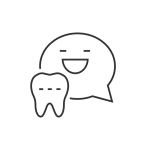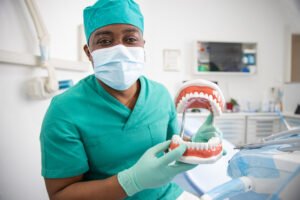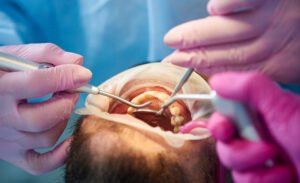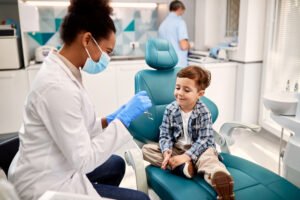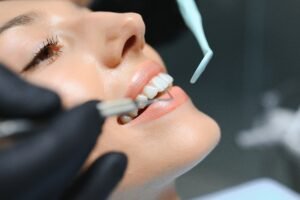Many older people lament their inability to consume and enjoy food as they could when they were younger. It may occasionally be brought on by digestive or other associated medical issues. However, tooth problems and a lack of oral care are frequently to blame for the unpleasant aspects of eating. Senior dental issues can lower one’s quality of life. That’s why you need to get senior dental care in Calgary once in a while to keep dental health intact.
Common issues by senior dental
Tooth decay
An extremely durable outer layer on your teeth is called enamel. A layer of microorganisms known as dental plaque accumulates on the enamel daily. One cannot see it with a naked eye, the the acids produced by the bacteria that make up plaque eat away at the enamel. Cavities appear as a result of enamel erosion. It is one of the reasons to consider senior dental care after a certain age.
Must See: Things to Do When You Have an Emergency Dental Situation
Cavities are undesirable at any age, but they are simpler to cure in younger individuals with fillings and other procedures. The natural aging process may have deteriorated the teeth and gums in older people, making treatments ineffective, infeasible, or not particularly long-lasting.
Even when brushing and flossing regularly and properly, which everyone knows is important, issues can still happen. Regular dental appointments ensure that issues are identified early when treatment is easier and faster.
Injuries
Older people may not engage in as much physical activity as they did when younger does not lessen their risk of injury. The majority of people who have to visit the emergency room are seniors. Ignoring a little oral injury may have catastrophic implications for the elderly, whose natural capacity to recuperate is less robust than it once was. There is no need to be embarrassed about going to the dentist for even a small tooth injury because doing so can help prevent needing more extensive care.
Gum diseases
Along the gum line, plaque accumulates similarly to the enamel. The bacteria in the plague infect the gums, making them sore and affecting the bone and gum tissue that support the teeth. This can lead to sensitive, bleed-prone gums and tooth loss at any age. The hazards are significantly higher for the elderly since their immune systems and metabolisms aren’t as powerful as they were younger. Although gum disease may be managed, it is always preferable to avoid it altogether by getting regular dental exams.
Read More: Common Orthodontic Problems, and How to Treat Them?
How can seniors keep their dental hygiene intact?
Regular dental cleaning
Your lifetime dental hygiene routine, which includes brushing and flossing, will be very helpful to you as you age. The first line of defense against bacterial accumulation, tooth decay, and gum disease is brushing. This is not the time to let up on your brushing and flossing regimen, even if you have never had a cavity.
It is wise to put extra effort into preventing cavities every day since older people tend to get gum disease and tooth decay. Many dentists believe that fluoride toothpaste must be used at least twice daily and even between meals if required. Additionally, you should include cleaning between your teeth every day using dental floss or another thing made specifically for that purpose.
Read More: What are the Different Types of Professional Teeth Whitening Treatments?
Dental check-ups
Nowadays, dental treatment in Calgary is considerably more widely available. While some people may not have gone to the dentist regularly growing up, it is crucial for seniors. A yearly dental examination can help your at-home cleaning efforts and spot early gum disease and tooth decay indications.
Consider your dentist to be a member of your regular medical staff. Update him on any drugs you’re taking and any health problems you’ve had since your previous exam. He can offer advice on how to improve your dental hygiene regimen. Remember that your oral health can impact the rest of your body, so discuss any dietary, lifestyle, or health changes you’ve made since your last appointment with your dentist.
Diet and lifestyle
Oral hygiene might be impacted by whatever you put in your mouth. You may maintain healthy teeth and gums by eating a balanced diet with fresh fruits and vegetables. Chewing is a beneficial mouth exercise.
It’s bad for your oral health to smoke or chew tobacco. Even if you have used tobacco products for a long time without experiencing any evident symptoms, your risk for health problems grows as you age. Inquire about tobacco-quitting aids that can enhance your dental health with your dentist.
Check Now: What Is a Dental Bridge and How Does It Improve Oral Health?
Dry mouth
It’s critical to recognize the symptoms of dry mouth and take action to alleviate it. A dry mouth can hasten tooth decay, make dentures fit incorrectly, and aggravate the skin directly beneath them. You might lessen or eliminate dry mouth by incorporating moisturizing mouthwash into your daily oral care routine. Additionally, some sprays and gums promote salivation. Pharmacy artificial saliva products are readily accessible, but it’s a good idea to talk to your dentist in Calgary about which one is best for you.
Senior dental services that can help to alleviate the dental problems
Dental implants – a crown and titanium cone replacement for a lost tooth that is exceptionally stable and long-lasting.
Dental bridges – a filling material used to fill voids created by two or more nearby missing teeth. On either side of the gap, it is fastened to the original teeth.
Must See: A Parent’s Guide to Children’s Dental Care: Establishing Healthy Habits Early
Crowns – a cap that strengthens teeth, gives them their natural size and form back, or hides teeth that are discolored or have poor shapes. A crown is also put on top to give an implant the appearance of a real tooth.
Veneers – a custom-made cap that fits over the teeth in the front to hide discolored, chipped, decaying, or misaligned teeth.
Partial dentures – a set of artificial teeth that may be removed and are designed to match your mouth.
Conclusion
Today, we understand that maintaining good oral health is essential to a healthy lifestyle. Although attractive teeth are excellent, the condition of your gums and other oral tissues may be more crucial. Whatever happens in your mouth at old age will have an impact on the rest of your fragile body, and it has the potential to alter your health significantly.

